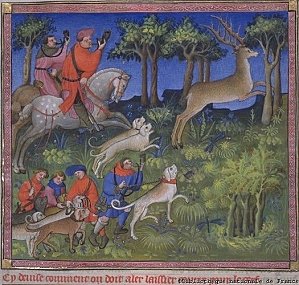Work on a chapter for an edited collection on jugement poetry involves some rehashing…and a brief rant about Sound Studies.

I spent the week before Christmas writing a draft of the chapter for a volume on medieval jugement poetry that will be edited by R. Barton Palmer and Burt Kimmelman for Florida University Press. It will probably appear in a year or so and I’ll certainly post the chapter when it’s out.
I volunteered for the volume because I think that jugement poetry — the lengthy debate poems of fourteenth and fifteenth-century French literature — is very tightly bound up with music and I thought there should be a musicologist in the volume. It meant, however, revisiting a poem that I’ve already devoted a whole chapter to in my 2007 book, Sung Birds, Gace de la Buigne’s Le roman des deduis.
It’s probably one of the perils of the mid-career stage that one ends up writing a lot of things that are a rehash of earlier work, partly because one is too busy to do new research, partly because people ask you to write on what they know you’ve already written about. The process can sometimes be a bit wearisome — an endless cut-and-paste with re-wording — but on the positive side it also gives one an opportunity to reflect on the development of one’s thinking.
About ten years after I first read it, I still think Gace’s poem (all 12,210 lines of it), is extremely interesting and deserves to be better known and more widely read (at least, certainly among medievalists). That is isn’t, is probably partly because there’s no English translation. But there is also a problem with its genre: it appears to be nothing more than a rather lengthy hunting treatise, cast in a long narrative poem with a first part that is a battle between the vices and virtues, and a second part that is a debate between representatives of hawking versus representatives of hunting with hounds as to whose sport is nobler and more pleasurable. This makes it too literary for historians with an interest in hunting and too cynegetico-technical for literary scholars. And musicologists (only interested in composers, musical works, and musical genres, of course!) have looked only at three short passages: one which mentions Philippe de Vitry as the author of a motet (Douce playsence/Garison selon nature/NEUMA; recording here) whose texts are alluded to, one which mentions lesser-known singer-composer Denis le Grant as the author of a chace (Se je chant; recording here) whose text is alluded to, and a third passage which praises the sound of dogs running after a stag in terms that compare their noise to the hocketing of a polyphonic motet.
In my treatment of this poem in my book, I was interested in correcting what I viewed as the incorrect understanding of the last of these three passages by musicologists, and in viewing the whole poem within the broader literature of Latin music theory, which underpins many of its key arguments and which had been missed in the literary and historical discussions of the poem. In the chapter for Palmer and Kimmelman’s Judgement Book, I am interested more narrowly on the mirror-for-princes aspect of the poem and the ideological role of music at court that its citation of two real pieces of music implies.
My consideration of music as ideology allows me to use some things I’ve thought and written about since my 2007 book. My new piece uses the idea of distributed cognition in the performance of medieval song (which I first developed here) to think about song as mimetic of political functioning in a communal setting. It also uses my engagement with the creation of meaning in polytextual music (which I talk about most clearly here, but have also dealt with in my more recent book on Machaut) to claim that song functions as a means of prompting contemplation as well as being itself an object of (silent) contemplation, reasoned discourse, visual spectacle. Oh, yes — and pleasurable sound.
My strong conviction, arising from engaging with open and explicitly intertextual texts like Gace’s poem, that music in the middle ages is not just sound (and sometimes, not even sound) is currently adding to my growing disquiet at the boxing of musicology into the soi-disant ’emerging field’ of Sound Studies in the modern academy. Music is so much more than sound! Not only is music more multimedia and multi-sensory than that (and not just in the middle ages), but it is also something present in non-sensory ways, i.e. intellectually. And this, I think, is the problem — the social mistrust of elite (i.e. difficult, speculative, and highly informed) intellection and contemplation in a market-driven society that has elided democracy and populism as a single unassailable moral good. Sound Studies typically claims that it studies sound in a way broader than musicology but fails to see how it also studies it in a much, much narrower way.
But now this is turning into a rant and I don’t have space to get into this particular polemic in the chapter, but I think it might be something I’ll write or blog about in the future…